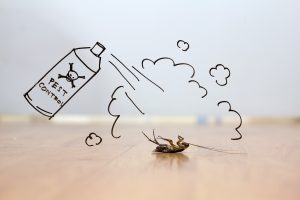
The warmer weather is finally here and summer is just around the corner but that also means a return of wasps.
These buzzing pests can be a real problem if they make their home near you house or property presenting a threat of being stung.
While wasps are very much a part of nature and part and parcel of the warmer summer months there are some steps you can take to protect your home and family from these summer pests.
What attracts wasps?
As with many household
pests discarded food is the biggest problem when it comes to attracting wasps. Sweet food and drink in particular attract wasps in the later months of summer but all food sources can contribute the problem.
To reduce the problem of wasps becoming a pest in your home this summer make sure you clear up after eating picnics in the garden, store rubbish carefully and keep your compost heap covered.
If you grow fruit in your garden take care to pick up fruit that has fallen onto the floor – as this will be particularly attractive to wasps in the later summer months.
Controlling how wasps get into the home is also worth considering, although no-one wants to spend summer with the doors and windows shut. Check for any holes or gaps in the fabric of your house that should not be there and consider using a fly screen to deter all flying insects.
A natural predator
Keeping wasps at bay in the first place is the best way to approach pest control, after all while a pest to humans, wasps serve an
important role in nature.
Their aggressive nature, which makes wasps such a concern, is also what makes them an excellent predator that is very efficient at controlling pests that destroy plants and crops. Like bees, wasps also play their part in the pollination process.
Natural deterrents
Although there are obvious benefits to bees and wasps visiting your garden you may want to reduce the frequency of these visits, particularly if you have young children or have an allergy. Covering up and not wearing perfume is a good start to protect yourself from being stung.
There is some evidence that wasps do not like mint, wormwood and lemongrass so planting these could help to keep the number of wasps visiting your garden down.
Avoiding angering wasps in perhaps the most important consideration for families and gardeners as this will stop them releasing the pheromone that acts as a call to arms to other wasps by signalling a threat.
When dealing with wasps the best way forward is not presenting a threat and covering up food sources.
Should you find a wasp’s nest on your property, or believe that you may have one, you will need
pest control advice.
Get in touch with pest busters to discuss any concerns you may have about pests in your home.
https://www.pest-busters.co.uk/pest-control-news/latest-news/the-sunshine-has-returned-and-so-have-wasps-steps-to-take-to-avoid-being-stung/
 The warmer weather is finally here and summer is just around the corner but that also means a return of wasps.
These buzzing pests can be a real problem if they make their home near you house or property presenting a threat of being stung.
While wasps are very much a part of nature and part and parcel of the warmer summer months there are some steps you can take to protect your home and family from these summer pests.
The warmer weather is finally here and summer is just around the corner but that also means a return of wasps.
These buzzing pests can be a real problem if they make their home near you house or property presenting a threat of being stung.
While wasps are very much a part of nature and part and parcel of the warmer summer months there are some steps you can take to protect your home and family from these summer pests.
Comments
Post a Comment